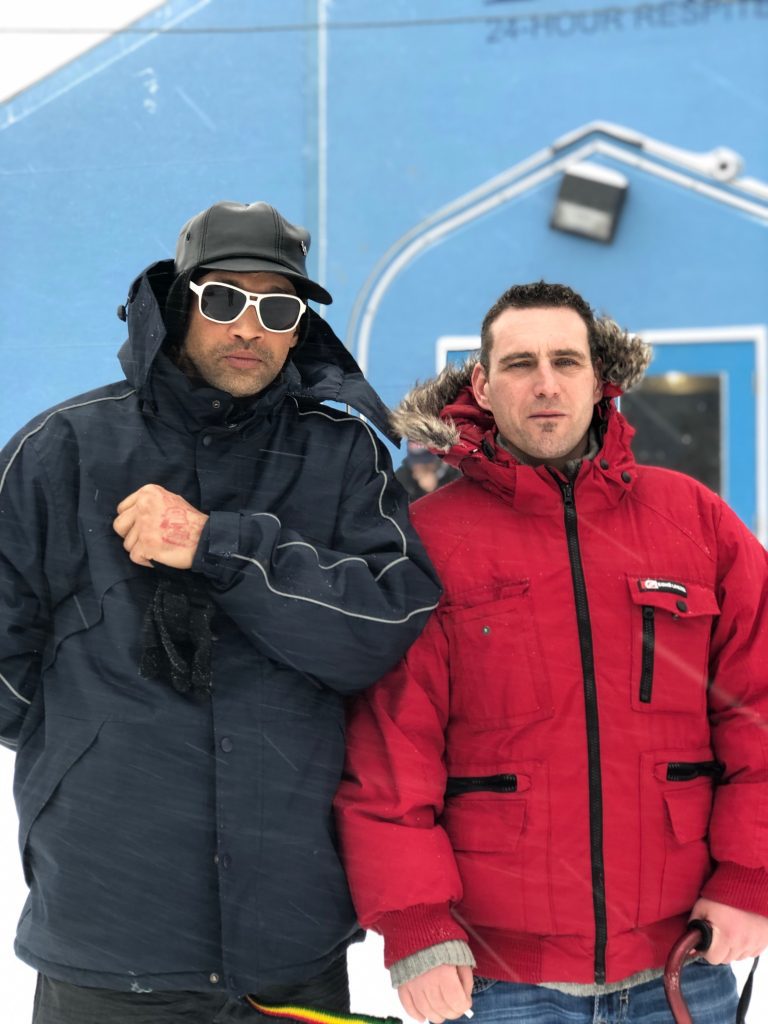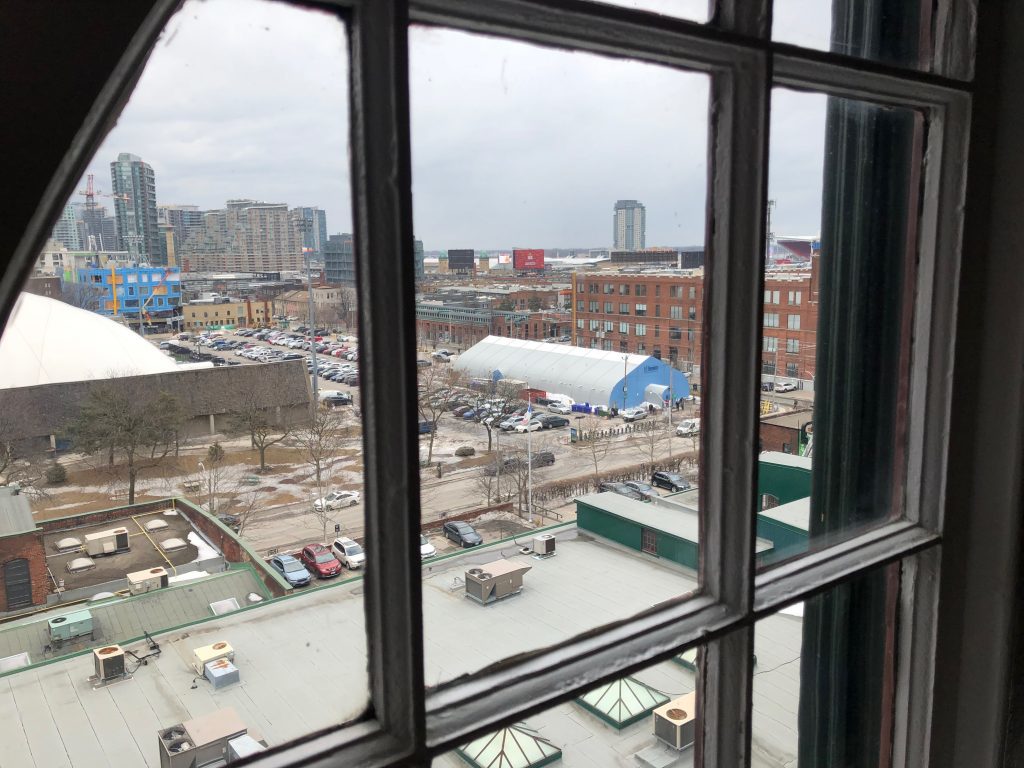[vc_row][vc_column][vc_column_text]
By Manuela Vega
Seated on folding chairs, five people play cards at a long rectangular table. Others walk in and out of a nearby washroom and two women stand by the front desk, awaiting assistance.
One rolls her eyes and curls her lip, resting her left elbow on the counter. Her palm cups her chin until she is tended to. The other mumbles quietly and slightly teeters from side to side. She only points to a bottle of soap.
Two staff members seated behind the desk stare at their screens, looking up momentarily to assure the women that they’ll get them their paper towel and soap.
Grey walls curve into an arched ceiling, permitting natural light to shine only through rectangular windows in each of the indigo double doors at the entrance. In the stuffy warmth, clients find refuge from chill February winds.
It’s not a haven, but it is a lifeline.
This is St. Felix Centre – 69 Fraser Ave., one of 10 respite sites in Toronto. Although it is funded by the city, the St. Felix Centre has been running the Liberty Village site since it opened in December 2018.
It provides people on the street with meals, somewhere warm to sleep, and referrals to resources and social services. There is no restriction on who is granted entry.
-

Friends Ruckus Mayes (left) and Stewart Watson (right) are clients at St. Felix – 69 Fraser. They pose outside of the respite site on February 12, 2019. (Manuela Vega/ T·) -

Mayes and Watson, pictured Feb.12, 2019, have been staying at St. Felix for a few months as they search for more permanent housing. (Manuela Vega/ T·)
St. Felix guest Stewart Watson tells his story
To accommodate a large group of people in a small dome on the Lamport Stadium parking lot, 100 cots sit in tight rows behind a grey divider that hides them from view of the entrance.
In 2014, Toronto’s first two 24-hour respite sites opened, including one at the St. Felix Centre’s headquarters, 25 Augusta Ave. in Kensington Market. Since then, the city has gradually increased the number of sites to alleviate the strain on shelters and to meet the needs of people on the street.
Although the emergency centres initially opened to ensure people had shelter in extremely cold weather, they now operate year-round.
March 22, 2019 at the respite site is sunny and warm but just over a month prior on Feb. 12, 2019 its surroundings are covered in snow. (Manuela Vega/ T·)
Outside 69 Fraser, a group forms a circle about a metre from the entrance. As they smoke cigarettes, two of them stand, one sits in a wheelchair and one is crouched down. Their jackets aren’t heavy, but the piercing cold doesn’t bother them. They laugh occasionally.
[/vc_column_text][vc_column_text][/vc_column_text][/vc_column][/vc_row][vc_row][vc_column][vc_column_text]
In February 2019, on any given night, an average of 6,861 people used a shelter in Toronto, an increase of about 55 per cent from one year before. Although the shelter system has expanded its efforts to meet emergency demand, long-term housing continues to be years out of reach for thousands. The end of 2018 saw 100,515 people on the waiting list for subsidized housing.
Enrique Cochegrus is taking a call. His office has two desks, each with a computer; one his and the other, his colleague’s. There are no windows, but dogs wander in periodically. As soon as one walks in, someone takes them out. Another dog joins a staff member as they retrieve a leash.
Cochegrus is the communications and business manager of St. Felix, but this wasn’t always his path. In Mexico, he was a successful businessman. Cochegrus had the distribution rights for the paper product company Kimberly Clark in the southeastern part of the country. Although he didn’t learn anything about social work, he harnessed the communication skills that he uses today at St. Felix.
When he and his family moved so his Mexican-Canadian children could finish their studies in Canada, the volunteer work that he did to keep busy eventually revealed what he sees as his mission: helping people.
He sold his business and has been a manager at St. Felix for two years now.
“If you are getting involved in some way, shape or form, the closer we will be to remove and eradicate poverty in the city,” says Cochegrus. “We just all need to get on board to fix it.”
Cochegrus connects with businesses in Liberty Village. Beyond asking for support, he has aimed to provide them with information about who their new neighbours at the respite centre are.
“Some people in the area didn’t know what to expect,” he says. “Many had in their minds the labels society has imposed on these vulnerable groups.”
People who have never interacted with individuals struggling with mental illness, addiction or homelessness may inaccurately label them as lazy, aggressive, uneducated or “unable to interact with others as a valuable member of the community,” he explains.
However, Cochegrus says the vast majority of residents of Liberty Village have been “amazing supporters of the program” and seem to recognize the importance of supporting those in need.
People in Liberty Village were quick to ask on Facebook where they could drop off donations, how they could volunteer or how else they could get involved when it was first announced that the respite site would be opening, he and community partners say.
Dan Armstrong didn’t hesitate to support St. Felix, either. When Cochegrus approached him, the CEO of telecom firm Beanfield Metroconnect knew exactly how to help: he provided the centre with free internet service.
“It wasn’t even a decision. We try and provide free service to anyone we can,” says Armstrong. “As long as it’s not gonna cost us an enormous amount of money, we’re happy to do it.”
Armstrong says Beanfield’s contract for work on the city’s waterfront development project requires the company to provide free internet for buildings designated as shelters or low-income housing.
-

Armstrong’s view of the respite site from his office in the Toronto Carpet Factory on March 11, 2019. (Manuela Vega/ T·) -

Armstrong stands in the Beanfield Metroconnect office on March 11, 2019. (Manuela Vega/ T·)
From his office window, he has a clear view of St. Felix seven storeys below and one street east.
At Beanfield, windows that occupy the majority of one wall welcome natural light. Ceilings are high and Armstrong’s private office walls are purely glass. Most people work on computers that are lined up on long desks, talking to the person beside, next to or behind them.
Despite being the founder and CEO of a successful internet company with a modern workspace, Armstrong’s T-shirt and jeans match his laid-back demeanour.
“I think it’s really important to pick up the people that are lagging behind a little bit and bring them forward.”
The CEO expresses his distaste for NIMBYism (Not In My Backyard) and the marginalizing terminology directed at people experiencing homelessness.
He explains the strong sense of understanding that came from joining St. Felix in its first year participating in the Coldest Night of the Year, a national fundraising event in which sponsors walk around the city on a winter night.
The event raises money for charities that address homelessness and also demonstrates participants’ concern for people with no home who endure “isolation, guilt and despair” as they battle hunger and violence.
Also there that February night was Rachel Abrams, who says she understands the impact of St. Felix on people in “the most at-risk place.”
[/vc_column_text][vc_column_text][/vc_column_text][/vc_column][/vc_row][vc_row][vc_column]
[/vc_column][/vc_row][vc_row][vc_column][vc_column_text]“They are really like the emergency room of the street.”
Abrams, a copywriter for the marketing communications company Cossette, is also a member of her company’s diversity committee. She credits her understanding of the respite site to her meetings with Cochegrus.
“Their goal is to get people from that respite site into a more permanent situation, into a more stable situation, into a safer situation,” says Abrams. “They are really like the emergency room of the street.”
To support St. Felix in providing relief, Cossette’s diversity committee raised awareness about the respite site’s clothing drive. Abrams worked with an art director to bring the message to life during the holiday season.
“We just wanted to make sure people were aware of the gravity of that donation,” says Abrams. “What seems like clothing that they’re just tossing away can really make a huge difference to somebody who’s on the street and freezing cold.”
Featured in the washrooms of Liberty Village restobars, the ads encourage people to donate their gently used clothing to St. Felix because “your old clothes could save a life.”
Like Beanfield Metroconnect and Cossette, those at Ampersand Studios donate clothing and mugs, items the respite site is in constant need of. Ampersand partners Glen Kerr and Ferial Rahbari didn’t wait for St. Felix to ask. They just stepped up and offered to help.
New Year’s Eve was Kerr and Rahbari’s first time volunteering at the site and it was packed.
They noticed some people repeating one action many times, spilling their coffee on the floor, or becoming easily irritated. Rahbari and Kerr took these as signs of mental health struggles. Other clients seemed young, like college or university students. Some even looked like they could be businesspeople. Some brought their pets.
With inclusivity comes a large clientele.
“They really try not to turn anyone away. They really tried to accommodate as much as they could,” says Kerr. “The staff were incredibly flexible. I admired that a lot.”
“In the centre we had some really, really cold nights,” says Rahbari. “You always wonder, because there are only so many beds in there, what if somebody doesn’t get a bed?”
Winter has passed and although springtime has brought warmer weather, demand is high. On April 11, St. Felix operated at full capacity. All 100 cots were used.
[/vc_column_text][/vc_column][/vc_row]
